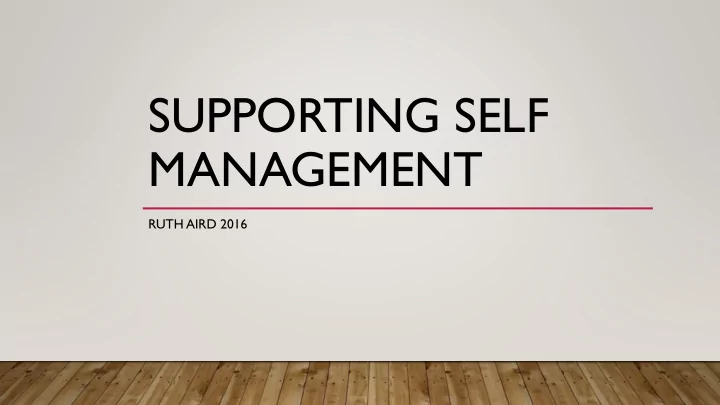

SUPPORTING SELF MANAGEMENT RUTH AIRD 2016
DEFINITION ‘a concept where the person takes ownership and is central. It is a process of becoming empowered to manage life with long term conditions. It is not an individual action, specific treatment or service; neither can it be delivered by a single organisation. Self-management is the successful outcome of the person and all appropriate individuals and services working together to support him or her to deal with the very real implications of living the rest of their life with one or more long term condition’ Scottish Government and Long T erm Conditions Alliance (2008) Supporting people in the community who live with life altering conditions to self manage, and in so doing increase their quality of life to a personal level that empowers and enables normality of living.
WHAT LIFE ALTERING CONDITIONS? • Obesity • Smoking • High level of alcohol intake • Low level exercise • Dietary challenges • Addictions • Medical conditions: Asthma; COPD; hypertension; immobility; CVD; Diabetes…….
SERVICE USERS ACCESS POINTS • General Practice – 31% of consultations by GPNs (ISD, 2013) • Long term management of conditions • Annual reviews • AHP – pharmacists; physiotherapists; dieticians
WHAT DO YOU ALREADY DO IN PRACTICE THAT CAN BE DESCRIBED AS SUPPORTING SELF MANAGEMENT?
MODELS AND TOOLKITS FOR SUPPORTING SELF MANAGEMENT • Motivational interviewing • Health behaviour change ‘The stages of behaviour change’ Grimley and Prochaska (1997 and 1992). • The Year of Care consultation skills • Group Consultations • Health Literacy
TEACH BACK • Health Literacy in Scotland. Making it Easy from NES onVimeo • http://www.healthliteracyplace.org.uk/resource-library/document/t/teach-back-postcard/
THE YEAR OF CARE OCTOBER 2008 • The Year of Care programme sets out to learn how routine care can be redesigned and commissioned to provide a personalised approach, including support for self management, for people with long term conditions, starting with diabetes by: • Gather and share stories • Systematic review of domains Exploring and discussing information • • Goal Setting • Action planning
TOOLKIT FOR THE YEAR OF CARE Exercise 1: Exploring your philosophy - What do you think ? (Reflective Exercise ) The person with a long term condition is in charge of their own life and managing their condition(s). The person with a long term condition is the main decision-maker in terms of how they live with and manage their condition(s). The person with a long term condition is more likely to act upon the decisions they make themselves rather than those made for them by a professional. The person with a long term condition and the health care professional are equals, and experts.
EXERCISE 2: EXPLORING YOUR PHILOSOPHY - WHAT WOULD YOU DO? (REFLECTIVE EXERCISE) • Mrs Grey, aged 63 who has been diagnosed with high blood pressure for 3 years tells you in a consultation that she has stopped taking her blood pressure treatments based on something that she saw on the internet. Her blood pressure is 156/94. How would you respond using the Year of Care philosophy? • Mr Black aged 57, has a BMI of 35 and has had type 2 diabetes for 2 years. His HbA1c is 7.9% (63 mmol/mol ). He is very reluctant to start medication and at the last two consultations has ‘promised’ to lose weight by cutting back on his portion size and increasing his physical activity. At this consultation Mr Black’s weight has increased slightly (1kg). How would you respond using the Year of Care philosophy?
Marie-Rose is a 61 year old recently widowed female, who had a previously borderline raised fasting blood glucose test. She is attending today for a repeat fasting blood glucose. Her body mass index (BMI) is 32 and she has had challenges all her life with keeping her weight down to a normal BMI of between19-25. It has become more of a problem since losing her husband as she has suffered from depression and loneliness. She has been coming to see you annually for her asthma/hypertension reviews and you know her circumstances well, in fact you have a good working relationship with Marie-Rose. To compound the difficulties with her weight her blood pressure has recently been elevated (148/94) and you suspect that she has been increasing her alcohol intake due to her social and psychological circumstances. On the plus side she has never smoked but you are not sure how compliant she is with anti-hypertensive medication and inhalers. She is on a low dose ACE, a statin, aspirin and SABA. She is now sitting in front of you and makes the following statement: ‘I wish I could start all over again, how can I manage this when I have so many problems?’
REFERENCES • Information Scotland Division (ISD) (2013) Practice T eam Information (PTI) Support http://www.isdscotland.org/Health-T opics/General-Practice/GP-Consultations/ • Prezi presentation: Supporting self management Aird, R. 2016 http://prezi.com/plrztterzsz_/?utm_campaign=share&utm_medium=copy&rc=ex0share • Year of Care: Getting to Grips with the Year of Care 2008 Available at: http://www.yearofcare.co.uk/sites/default/files/images/Getting%20to%20Grips%20with%20the%2 0Year%20of%20Care%20A%20Practical%20Guide.pdf accessed 7 July 2016
Recommend
More recommend